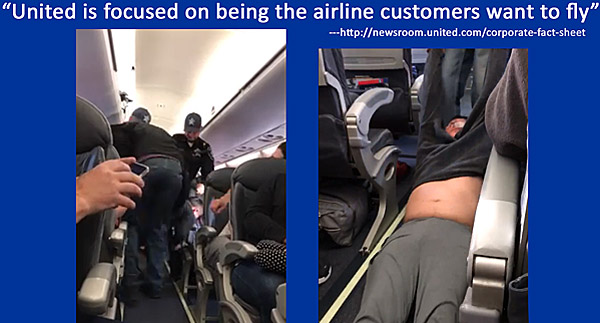


Shooting Your Reputation in the Foot: Self-Inflicted Crisis Management Lessons from United Airlines
[by Howard Fencl, Hennes Communications]
A video recently removed from Facebook shows law enforcement officers violently removing a passenger on a United Airlines flight from Chicago to Louisville right before takeoff. The flight was overbooked, and a United crew of four needed seats so they could get to Louisville, where they had a flight to work. Passengers were offered $800 vouchers to take a later flight, but United could not convince enough passengers to take them up on the deal. So they dragged a screaming man down the aisle and off the plane in front of horrified passengers.
United CEO Oscar Munoz needed to immediately apologize. He did not. Instead he offered a non-apology, “for having to re-accommodate these customers.” Basically, he apologized for United’s overbooking policy, and not the violence and humiliation their passenger suffered, or the emotional distress it caused all the other passengers witnessing this unnecessary event.
While Mr. Munoz said “this is an upsetting event to all of us,” and “we are also reaching out to this passenger to talk directly to him,” the apology should have gone something like this:
“We are shocked and appalled by what happened to this passenger, we are deeply sorry this incident occurred. We apologize to him and to all of the passengers on that flight. This was an unacceptable situation, and we have launched an investigation to learn how this happened, and how we can change our overbooking policy so this never happens again.”
Apologies, however, are meaningless without actions. When Mr. Munoz reaches out to this passenger – something he should immediately do so personally on the phone or in person – he should not only offer his most sincere apology, he should comp the gentleman a year’s worth of flights. It likely won’t head off a lawsuit, but good will of some kind – a generous kind – needs to be extended. In addition:
- There must be a discussion with security personnel about acceptable and unacceptable procedures in an overbooking situation. Who ordered that the passenger be physically removed?
- There should also be discussion internally about sharing information with passengers when incidents like this occur. There was apparently no follow-up information shared with passengers about the condition of the man they saw violently dragged past them and off the flight – who then apparently somehow re-boarded, dazed and bleeding. Without violating confidentiality, they could at least have shared that they understand the man is OK and that United is talking with him.
- As we often tell our clients, it’s not just what you say – it’s what you do. Ultimately, the bigger picture here is that United needs to overhaul its overbooking policy. If it is known that a flight crew needs to take seats with passengers on a flight, that must be known well-enough in advance that employees staffing the gate make room for them BEFORE passengers are boarded. Also, if an $800 voucher wasn’t convincing enough, United could have upped the dollar amount further until they had some takers, which in the long run would have cost them a lot less than what the current situation will likely cost in terms of prestige and the passenger’s likely lawsuit.
Will this impact United’s sales? It may to a small degree in the short term. The Twitter outrage response machine immediately kicked into high gear with tweeters vowing never to fly the friendly skies again. While the public has a famously short attention span, with the recent “leggings” incident and now this violent episode, United keeps shooting itself in the foot and is developing a reputation they cannot possibly find acceptable. After all, their mission includes this statement: “United is focused on being the airline customers want to fly.” Irony aside, one Twitter post may sum up the situation best for Mr. Munoz: “@united good news is that as people see video of you assaulting a passenger, your overbooking problem should fix itself.”
A few days after the above was written about United Airlines, Howard Fencl brings us up-to-date:
In the three days that have passed since I drafted our initial blog post on this unnecessary incident, United Airlines CEO Oscar Munoz tried a do-over on ABC, finally offering what seemed to be a more heartfelt apology to Dr. David Dao, the 69-year-old passenger violently dragged off of a United flight last Sunday. He ordered that all passengers on the flight with Dr. Dao receive a full refund. The three Chicago Department of Aviation officers who strong-armed Dr. Dao are now on leave.
But in the end that’s all too little too late. These are actions that should have happened immediately. Mr. Munoz’ original tone deaf statements to the media and to United employees will continue to be regarded as the window into the corporation’s soul.
And there’s more news on Dr. Dao: (to read the rest, click here).
Another one of our colleagues, Nora Jacobs, was quoted at length about this situation, as detailed in CNN Money, where it was suggested that United Airlines just might be the most-hated company in the world right now.
Howard Fencl is a vice president at Hennes Communications, one of the few firms in the U.S. focused exclusively on crisis communications, crisis management and litigation communications. His crisis experience includes helping clients deal with accusations of criminal behavior, leadership changes, industrial accidents, product recalls and other high-stakes reputation issues.

